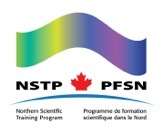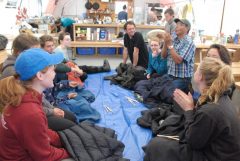 If you would like to receive funding from NSTP for field research to be conducted between April 1, 2026 and March 31, 2027 you must complete an NSTP application by October 26, 2025 in order to receive funds for the next fiscal year.
If you would like to receive funding from NSTP for field research to be conducted between April 1, 2026 and March 31, 2027 you must complete an NSTP application by October 26, 2025 in order to receive funds for the next fiscal year.
PLEASE NOTE THERE ARE 2 DEADLINES: YOU MUST SUBMIT YOUR COMPLETE APPLICATION FORM (INCLUDING SUPERVISOR RECOMMENDATION) BY THE CARLETON INTERNAL DEADLINE (OCTOBER 26, 2025) FOR INTERNAL REVIEW. THEN YOU WILL BE PROVIDED FEEDBACK THAT MUST BE ADDRESSED BY THE NSTP DEADLINE (NOVEMBER 10, 2025), OR YOUR APPLICATION WON’T BE FORWARDED TO NSTP.
Please carefully review the instructions provided in the NSTP Information Manual (the Student Application form Section has detailed instructions), as well as consulting the tips below, to help you prepare your NSTP Application.
Please carefully review the eligibility guidelines. There are rules on who (Canadian citizen or a permanent resident) can be funded, where the fieldwork can take place in Canada and abroad, and what the funds can be spent on.
NSTP application forms are available through the NSTP online system and submitted electronically. For technical assistance or questions regarding any aspect of the online system, please contact NSTP staff directly (email nstp-pfsn@polar-polaire.gc.ca or call 613-222-9537).
IMPORTANT DEADLINES
OCTOBER 26, 2025 – All applications for funding must be completed online and approved by your supervisor by this date. To meet this deadline is strongly recommended that all your portions of the application are complete online prior to October 21, in order to allow sufficient time for review and feedback from your supervisor.
OCTOBER 26, 2025 – All applicants must also submit a draft of the Field Activity Safety Plan (available here) to the Northern Research Committee Chair by email. Students planning on travelling together as part of the same field research team can submit all relevant information in one form.
NOVEMBER 10, 2025 – In early November you will receive feedback from the Northern Research Committee on your application form. This feedback must be addressed by this deadline or the application will not be forwarded to NSTP.
Students will be notified of funding allocation decisions in the spring of each year, as soon as NSTP confirms the total research funding allocated to Carleton University students.
TIPS FOR PREPARING YOUR NSTP APPLICATION
As you complete the online application form you will see some description of what information is required for each field. It is highly recommended that you also look at the Student Application form section in the NSTP Information Manual for further details about what NSTP is looking for. If students pay attention to these instructions, it will reduce the amount of back-and-forth between student and supervisor (before the Carleton internal deadline) and between the student/supervisor and the Northern Research Committee Chair (before the NSTP final deadline).
The following are comments that the Northern Research Committee Chair and Members commonly make each year in reviewing student applications. These kinds of comments must be addressed prior to the Chair approving a student’s application, and must be received PRIOR to the NSTP submission deadline in order for the submission to be passed on to NSTP.
Student Information: Academic Level – Be sure to indicate the degree and year you are currently enrolled in (i.e. this year, your degree/year as of the NSTP application deadline), unless you plan on doing your field research next September to March (in that case, it should be your current year + 1).
Title of Project – Consider including locational descriptors (e.g. community, territory, or specific field site) in your title, to help situate your research.
Brief Description of Project: – Be sure to clearly and concisely address ALL of the elements required in this section, including descriptions of:
- the project objective
- the research methodology and methods to be used
- if it is a continuing project, explain what stage you are at in your research, and relate your proposed work this year to work done in previous years
If your work is part of a larger project, it is important to include some of this relevant context, but be sure to focus mainly on the description of your particular research and related contributions.
Keep in mind that a committee with diverse northern expertise will be reading your application (both at Carleton and at the NSTP national level), so keep the language simple and clear, and define any technical or discipline-specific terms that you need to include.
Significance to the Student: – Be sure to clearly and concisely describe the significance of the research to your studies. This can include the importance of the work for completing a thesis project, valuable experience/relationship-building to provide the foundation for future research planned as part of a degree, etc.
Research Partners – Supervisors or other Carleton students SHOULD NOT be listed as Research Partners. This section is for identifying important research partners from other organizations/universities who are closely involved with the project planning, direction, and/or field work.
Rationale for the length of stay(s) in the North – NSTP encourages students to stay as long as possible in the North. Explain the reason for your proposed field dates in this free-form section. If there will be a short stay explain why (e.g. time limitations due to other commitments, transportation limitations, etc.), but also why this shorter duration will be sufficient for addressing your research objectives as explained in the project description. If you plan to undertake multiple trips, please justify this as well.
Support requested – Enter the break-down by category (Transportation, Living expenses, Freight and Interpreter fees) that you plan to spend your NSTP allocation on. The total of all these categories will be your NSTP request, which is capped at $6,000. You can review what expenses are eligible or ineligible in the NSTP Information Manual.
Other sources and amounts of funding – NSTP would like to know what funding you already have to support this research. In consultation with your supervisor, enter in the amount of funds that are dedicated to your fieldwork (not the whole project) by source. It is legitimate to enter in-kind support (e.g, aircraft paid for by a logistics agency, being transported by community members somewhere or staying with a northerner, etc.). In that case estimate the dollar value of the support. Please note that, if you do include scholarship funding, it should only be the specific portion of your scholarship that you plan to dedicate to supporting your field research (i.e., not the total scholarship amount). Keep in mind that NSTP is meant to be supplementary funding, so please be mindful of the ratio of NSTP support requested to the total amount required to conduct your work.
Ethical Principles – The the NSTP committee places great importance on community interaction and engagement. Please carefully consider the diversity of ways that community consultations, interactions, and relationship-building may be applicable within the context of your own research project and location. Make sure you follow the guidelines and examples in the NSTP Information Manual on this. There is a text box of up to 250 words. Do not skimp on this text.
Research Licence(s)/Permit(s) – Select/enter the appropriate licencing/permitting body for the relevant territory(ies) where field work is located. In the free form section below you can specify under whose name the permits are under (the student’s? supervisor’s? another research partner’s?), the duration or licence/permit approval (i.e., one year, multi-year, etc. with appropriate years noted). Be sure to highlight any steps you have taken to acquire local and territorial approvals for your research and who has (or plans to) report back to the communities that are nearest to your research sites.
Community interactions/Engagement – It is important that you consider how you will engage with the nearest community to your fieldwork so that you report your findings back and build relationships. An excellent resource for ideas and contact information of individuals or organizations who can help you to develop these elements of your research effectively are listed or linked to in Appendix 2 of the NSTP Information Manual. We encourage you to discuss this with your supervisor well ahead of planning field work or NSTP applications, especially if you may be new to northern field work or if you may be embarking on research in a new region of the North.
Supervisor roles – Students must invite their supervisor into their form by adding a collaborator. Students, ask your supervisor which email address works best for this. When supervisors accept the invitation, students will get a notification. Students must complete their part of the form before the supervisor can complete theirs.
- Students are responsible for preparing the NSTP application, but supervisors are asked to carefully review each section to ensure they address all required elements of the application prior to completing the Supervisor Recommendation, and approving the form for Chairperson review. This will greatly aid in streamlining the process, and helps to avoid iterative reviews after the initial submission.
- Supervisors are responsible for ensuring that the information within the form is correct and the quality of the application is high. They are not permitted to take ownership of the student’s form or complete the form on their behalf. For more details see the section on supervisors in the NSTP Information Manual.
- The student’s supervisor is also responsible for completing the recommendation section. Comments should focus on student training (including relevant previous training experience), how the NSTP-supported field work relates to student research (i.e., completing their thesis, and relevance to current northern issues) as well as to the student’s future in northern research. Please be sure to clearly explain how the student will benefit from the research conducted, and how having NSTP funding will contribute to this benefit. In addition, it is helpful for the supervisor to highlight any student interactions with northern communities, and how this will be relevant for conducting – or reporting on – their research.
- By signing the NSTP application, supervisors are confirming that they, and their student, are are familiar with the ethical principles and the licencing/permitting obligations that go along with northern research, and that they will ensure that their students conduct their research in accordance with these ethical principles. Approving the student’s report also means that the supervisor confirms that they have reviewed all sections of the NSTP application to ensure that they meet the required criteria laid out in the NSTP Information Manual, and in consideration of additional suggestions described in the sections above.
